by Hanna Roberts | Mar 22, 2019 | Academics, COBA Faculty, Marketing
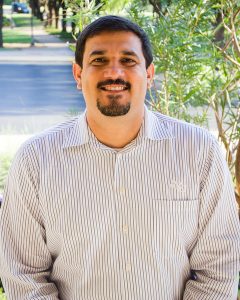 We are pleased to introduce you to Daniel Garcia (’04), who will be moving to a full-time faculty role within the College of Business Administration this fall. Garcia is from Cancún, Mexico and came to ACU as an international student. He graduated with majors in management and marketing, a certificate in missions, and a minor in global studies. Soon after graduation, Garcia began working in admissions as a multicultural marketing specialist to help recruit a more diverse student body across the U.S. and internationally. He has a masters degree in intercultural communication, a certificate in conflict resolution, and is finishing his M.B.A. through COBA’s new online program. He is currently the Director of Multicultural and International Enrollment and also teaches International Business (BUSA 419) and Principles of Marketing (MKTG 320). His wife, Yukari, is from Japan and they have two little girls and a one-month-old son. Garcia and his family attend the bilingual service at University Church of Christ.
We are pleased to introduce you to Daniel Garcia (’04), who will be moving to a full-time faculty role within the College of Business Administration this fall. Garcia is from Cancún, Mexico and came to ACU as an international student. He graduated with majors in management and marketing, a certificate in missions, and a minor in global studies. Soon after graduation, Garcia began working in admissions as a multicultural marketing specialist to help recruit a more diverse student body across the U.S. and internationally. He has a masters degree in intercultural communication, a certificate in conflict resolution, and is finishing his M.B.A. through COBA’s new online program. He is currently the Director of Multicultural and International Enrollment and also teaches International Business (BUSA 419) and Principles of Marketing (MKTG 320). His wife, Yukari, is from Japan and they have two little girls and a one-month-old son. Garcia and his family attend the bilingual service at University Church of Christ.
Q: What drew you to teaching?
A: I never considered teaching as a career until fairly recently. Several years ago, I was in Hong Kong on a recruiting trip and met a COBA study abroad group lead by Dr. Phil Vardiman. I was flying to Shanghai to recruit students at a university and invited Dr. Vardiman to come along, as students like to hear from faculty during the recruiting process. After watching me give a presentation to the prospective students about ACU, Dr. Vardiman started a conversation with me about teaching. Many more conversations later, I started teaching part-time for COBA last semester and am excited to move to full-time in the fall.
Q: Why do you enjoy teaching and working with college students?
A: A large part of my job in admissions and recruiting was talking up ACU and describing why it is such a unique university. One of the biggest factors that set ACU apart from other universities is our faculty. They are remarkably caring, intentional, and truly make a difference in students’ lives. After talking with Dr. Vardiman, I realized that I did not just want to talk about that difference, I wanted to make that difference. I am excited to help students learn how to hold a more global worldview. The more we learn about other cultures, the more we learn about our own and discover peace as we begin to understand each other. I believe in not just teaching content, but presenting it in new and innovative ways that emphasize a continually expanding worldview.
Q: Outside of teaching, what passions/hobbies do you have?
A: I have traveled internationally for ten years for work. Traveling is one of those professions that when people hear what you do, they assume you are just on a glorified vacation. There are also different perceptions of some places over others and the idea of glamorous travel wears off very quickly. To continuously travel for work for so long, you have to have a passion for what you do and a passion for other cultures. I love learning how those different from myself think, why they do what they do, and watching people solve the universally same problems in different ways.
Q: What is something that students might be surprised to find out about you?
A: I play on the “Sunflowers of Death” soccer team with Dr. Jessup and have a superhero alter ego, Chido Man, who represents the idea that God has given us talents to make a difference in the world.
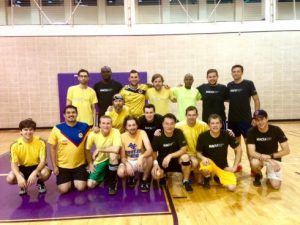
Garcia will continue to teach International Business and Principles of Marketing as he assumes his full-time position in the fall. We are excited to see what he does in this role and to welcome him further into the COBA family.
by Hanna Roberts | Feb 1, 2019 | Academics, COBA Events, COBA Faculty, COBA Staff, Current Students, Faith Infusion, Special Speakers
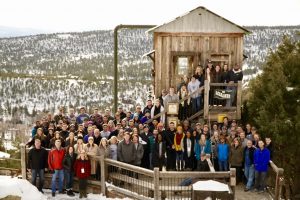
The 2019 Leadership Summit group.
In January, over seventy students traveled to the top of a mountain in Colorado and spent a week learning about leadership from thirteen speaker sessions and a team of faculty and staff from ACU. Through the dynamic speakers, practical application of what is taught, and spiritual insight, students are equipped for leadership in the family, in their community, in the church, and in the marketplace. This short course is one of the most transformational experiential learning opportunities COBA offers and is always a favorite for students that attend.
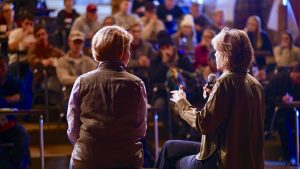
Wendy Davidson and Elise Mitchell speak to students.
A unique aspect of Leadership Summit is an opportunity for students to hear from CEO’s, inspiring speakers, and ACU faculty and staff and get to know these individuals on a personal level. “One of the speakers shared a really impactful story about facing significant troubles in the workplace as a direct result of sharing his faith,” said Lincoln Jones, a senior accounting and IS major. “His testimony encouraged me to not fear the backlash from bringing faith into the workplace.” Some of the speakers from this year include Brad Gautney, founder and president of Global Health Innovations, Rick Atchley, preaching minister at The Hills, Wendy Davidson, president of U.S. Specialty Channels Kellogg Company, Tim Goeglein, senior advisor to the president and vice president for External Relations at Focus on the Family and deputy director of the White House Office of Public Liaison from 2001-2008 for President George W. Bush, Carlos Sepulveda, chairman of Triumph Bancorp, Inc. and former president and CEO of Interstate Batteries, Mike Willoughby, CEO of PFSweb, Inc., Elise Mitchell, founder and chair of Mitchell Communications and CEO of Dentsu Aegis PR Network, and Pete and Austin Ochs, founder/chairman and CEO, respectively, of Capital III.
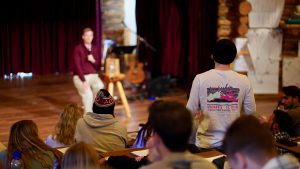
Students have the chance to ask speakers questions at the end of each session.
In addition to lecture sessions, students are able to spend time talking with speakers one-on-one and share meals with them. Some of the speakers serve as mentors for a ‘River Crossing’ project, a project that challenges students to make a plan to use their given leadership positions to make a difference in the world. Taylor Gould, a junior marketing major, said that her favorite part of the experience “was simply being in Colorado and feeling connected with my professors, classmates, and the speakers. It was amazing to be able to experience all of it with people who you would never meet otherwise and people you see every day. The lessons from the week were very applicable and made me feel so inspired.” A community connection is at the core of Leadership Summit and happens at many different levels between every person – speaker or student – in attendance.

Zach Smith, Hill Holloway, and Hayden Hood swing off the side of the mountain on ‘The Screamer.’
While the week offers many moments for educational, spiritual, and community-centric transformation, the location also allows students to have a lot of fun. The class is currently held at Frontier Ranch, a YoungLife camp outside of Buena Vista, Colorado and YoungLife staff serve the Summit attendees throughout the week. Students can hike up to the crosses at the top of a mountain peak, swing off the side of a mountain on the Screamer, play archery tag, and spend time building community and fellowship in the game room. These experiences give students the chance to spend time with each other and grow in deeper connection (and also face their fears, especially if they have a fear of heights).
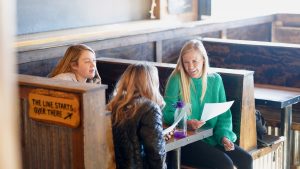
Students spend time in community with each other throughout the week.
Every year, students return to Abilene refreshed and challenged to make a difference in their communities and this year was no different. Mariel Delgado, a senior architecture and interior design major, shared that Summit “is not like any other business class you will ever take and the lessons you learn and friendships you make are unlike any other. Hearing everyone’s life stories from such a raw perspective but also just the fact that so many people took the time to come speak to us and pour into our lives for that week.” We look forward to watching how Mariel and all of the other students take what they have learned from the mountaintop and incorporate it into their lives to bring about change that lasts.
In the coming weeks, we will be sharing photos from the trip on our Facebook page as well as some of the speaker sessions for you to revisit and enjoy on our YouTube channel. Keep an eye out for these posts and future ones concerning the incredible and unique opportunity that is Leadership Summit.
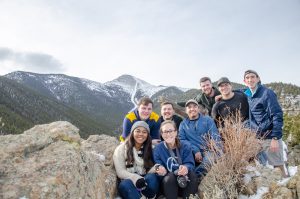
Students hike up to the crosses at the edge of one of the ridges of Mt. Princeton.
by Hanna Roberts | Jan 25, 2019 | Academics, City of Abilene, Current Students, Social Entrepreneurship, Uncategorized
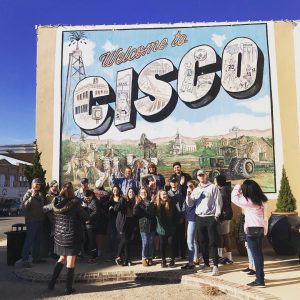
Business & Sustainability students take a tour of the newly revitalized Cisco Downtown.
In January, twenty-two students attended Dr. Sarah Easter’s Business & Sustainability course (MGMT 440), a one-week intensive class that educates students on the opportunities and challenges of developing more sustainable business strategies and practices, and to explore the changing role of business in society and in relation to the environment. “Typically in business, we focus on financial sustainability,” Dr. Easter explained. “We fail to consider the economic and social well-being aspects of sustainability, so this course looks at the impact businesses can have on the community and environment as well.” The course offers many different perspectives on sustainability, examining what that means for a variety of different companies, from large, global corporations to local, small businesses.
This was the third year that the course has been offered but the first year that Dr. Easter incorporated out-of-town field trips in addition to several guest speakers. The students spoke with Abilene business owners, several ACU professors from varying colleges, and with a panel of Cisco downtown business owners. Students took a tour around ACU with Corey Ruff, Associate Vice President of Operations, to understand the campus initiatives for sustainability on a deeper level. They also went to Disability Resources Inc., a residential community for individuals with intellectual disabilities.
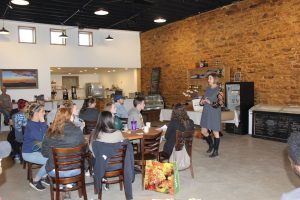
Cisco mayor Tammy Douglas speaks to Business & Sustainability students.
The students spent half a day in Cisco, TX. They spoke with Joy and Kerry Hedges, the owners of Slowpoke Farms and Slowpoke Market Store. The Hedges made significant lifestyle changes for sustainability regarding the food and products they consumed and extended those values beyond their personal life to their farming methods and business practices. In September, they opened the Slowpoke Market Store, which students were able to visit. The Slowpoke Market Store is a part of the revitalization effort in the downtown Cisco area. Students interacted with a panel of other business owners in the downtown area that are also involved with the revitalization efforts and with Tammy Douglas, Cisco’s first female mayor. Douglas explained the importance of local resources and how they have incorporated sustainable practices in the changes occurring in Cisco and gave students a tour of the downtown area.
By the end of the class, students were able to recognize interactions between environmental, social, and economic decisions, understand the power of business to negatively or positively impact their surroundings, gained exposure to how a variety of different organizations and perspectives tackle today’s sustainability challenges, and became more aware of their own role when participating in personal and professional decisions related to sustainability. Marissa Hickson, a senior marketing major, said that “the most impactful thing I learned in the class was the importance of researching the background, goals, and values of the companies I support. We learned how to evaluate sustainability reports and determine whether or not a company’s values align with ours. I learned that a lot of companies that I have trusted in the past don’t actually operate in the most ethical ways! It’s great to be aware of this now so that I can be sure to support the companies who are actively working to make our world a better place.” The class will be offered next January, so students can ask your advisor about this offering.
by M. C. Jennings | Dec 14, 2018 | Academics, COBA Faculty, COBA Staff, Current Students, Faith Infusion, School of Information Technology and Computing, Uncategorized
It’s graduation day for our December graduates and we wanted to take one more opportunity to celebrate this milestone in their lives. Last week, on December the 4th, COBA hosted a luncheon in their honor celebrating them and all of the hard work that has helped them reach this day. Faculty, staff and students enjoyed fellow-shipping with each other, learning more about students’ favorite experiences at ACU and what advice those that were a little older would give them as they go out into the world.
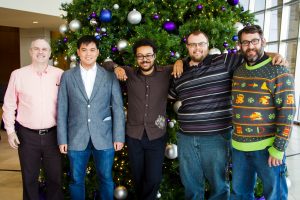
It’s our tradition for a faculty member to give a blessing over the graduates as we say goodbye to them. Dr. David Perkins, Professor of Accounting, did this in an unusual way this year. Known for his guitar ballads in class, he chose to sing the blessing over them with a David Perkins original song.
We hope you’ll enjoy hearing his message to the students as well as seeing some pictures from the event. To the class of 2018 we say thank you for choosing ACU, for investing of yourself in the process, and for making us all better people during your time here. May God bless you and give you 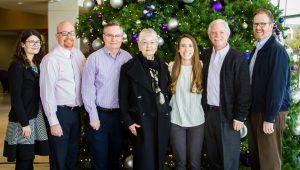 wisdom and direction knowing that He has designed you for His purpose and good works, which he has planned and prepared in advance for you to do.
wisdom and direction knowing that He has designed you for His purpose and good works, which he has planned and prepared in advance for you to do.
To view the video, click here.
To view all of the pictures from the luncheon, click here.
by Hanna Roberts | Dec 6, 2018 | Academics, Accounting, College Decisions, Current Students, MAcc, Student Spotlights
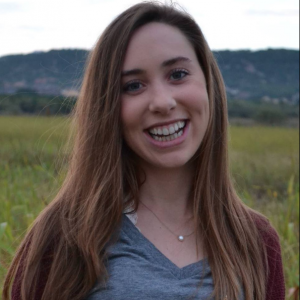
Lexi Koon, graduating senior accounting and major from Denver, Colorado.
Lexi Koon is a senior accounting and management major with a concentration in entrepreneurship from Denver, Colorado. She is in the integrated Masters of Accountancy program and wants to pursue a career as a CPA after graduation. We asked Lexi a few questions about her time at ACU. Read her answers below!
Q: How has your education at ACU, especially in your department, prepared you for the future?
A: My education at ACU has taught me a lot about learning how to see the world from other people’s perspectives and to be a better listener. That applies primarily to my classes outside of my business classes such as my bible classes, my communications classes, and other electives I have had to take over the years. As far as my education in the accounting department, I feel as though I have been prepared by the accounting department to understand the technical skills I will need to further my career as a CPA. It feels really great to come out of four years of school and know that I actually have the skill sets to be successful in a specific field and to also know that I will use what I learned in those classrooms every day in my career. In the business management department, my professors prepared me for my future by exposing me to different aspects of business as a whole, they inspired me to set extraordinary goals and challenged me to dream big (like in entrepreneurship class with Jim Litton), and above all else, they prepared me by showing me they believed in me.
Q: What has been your favorite thing/memory about your time at ACU and COBA?
A: Wow, that is a really hard question. I don’t know if I can necessarily pick a favorite, but it’s more-so a combination of all the times professors tried really hard to make bad jokes in class, when they invited us over for “Grilleniums” or when they invited us to worship events at their church. My most cherished memories have been when professors stopped class to give us a “real talk” about life or when they shared what was going on in their lives to give us encouragement in ours. My favorite experience at ACU by far has been getting to have my professors over and over again in class and building relationships with them to where I know they actually care about their students. From book club with Dr. Laura Phillips to bible study with Dr. Easter, they all have made a huge impact on my life as a student at ACU. The professors at ACU are funny, they are thoughtful, they are kind, and they are beyond caring.
Q: What was your favorite class in the accounting department?
A: Answering this question is difficult because the professors are all so different. All of the professors are great and they all bring a different character to the classroom. Content-wise and professor-wise, I would have to say Income Tax with Dr. Fowler has been my favorite class as an undergraduate. I dreaded having to take that class because, well, who wants to learn about taxes? I found that Dr. Fowler is one of few people in the world who can actually make learning about tax fun. He made us laugh almost every day and he challenged us, but he also believed in us. I’m also currently in his Corporate Tax class in the MAcc program and I can say that may be the hardest class I have ever taken but I still love it because he teaches it and constantly re-affirms us that we can do it.
Q: Who was your favorite professor and why?
A: I spoke a little about Dr. Fowler in that last question, but to answer this question, Dr. Fowler was my favorite professor because he went above and beyond to make us know that we are more than just a number in his class. He is typically known for teaching some of the hardest classes in the accounting department but he is also the professor that sends us emails to tell us he believes in us, that he is proud of us, and that he is here for us. Almost every day in class, he tells us a funny story to make what should be boring content enjoyable, and several times throughout the semester he has stopped class to point out seasons of celebration in our own lives and other times he took the time to be real with where he’s at and the hardships that life faces us all. He made our classes become family and I would go back and take those extremely hard classes again as long as I knew he was teaching it.
Q: If you could talk to a prospective student considering coming to ACU, why would you tell them to choose ACU?
A: I would tell them to choose ACU because it is like no other college they will go to. The “ACU Difference” is the community that you find along the way. This should be apparent in my responses from earlier questions, but the professors, the faculty, and the students have shown me what it is to look at those who are different from me and want to learn from them, to learn how to love them, and to be surrounded by a circle of people who have your back 100%. As I leave ACU, I feel completely supported and surrounded by an extraordinary amount of love and I am thankful. You will never be a number here. The first year is tough at any college, but as you continue to grow your experience here, you will walk around and be known, and that is what the walking in the Kingdom looks like.
by M. C. Jennings | Oct 2, 2018 | Academics, Accounting, COBA Faculty, Current Students, MAcc, Uncategorized
Our last installment in our COBA Study Abroad series highlights the MAcc (Master in Accountancy) trip to Australia and New Zealand, led by Dr. Curtis Clements and Dr. Kyle Tippens. MAcc students received credit for International Accounting and Financial Reporting and International Financial Markets. We can’t think of a better way to learn about global business than being immersed in it! We asked Dr. Clements to tell us what it’s like to learn in the land down under.
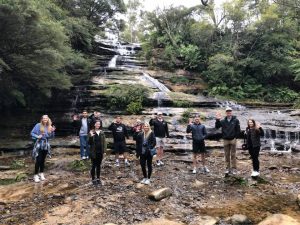
What made your destination a unique place to study?
We didn’t really have a home city. Instead, we traveled to three cities: Sydney and Melbourne in Australia and Auckland in New Zealand. We chose Australia and New Zealand because we had business contacts there and for their diverse cultures.
What businesses were you able to visit?
We visited a number of companies and organizations. These include PWC, KPMG, EY, the Sydney Wool Exchange, The Australian Accounting Standards Board, The Australian Auditing Standards Board, ANZ Bank, Australia-New Zealand Chartered Accountants, and Xerox.

Did you take the students on any sight seeing tours?
In Sydney we went to Taronga Zoo. Taronga is a world-class zoo with many different animals from around the world. We also took a nighttime harbor cruise during the Vivid Sydney festival, which was outstanding. In Melbourne, we took a trip outside the city on a train powered by a steam engine. In New Zealand, we toured Hobbiton where the Lord of the Rings movies were filmed as well as the Hobbit movies. We also went to the Te Puia Maori Village cultural center in Rotorua. On their own, the students also traveled to the Blue Mountains, Manly Beach, and Bondi Beach in Sydney. They attended an Aussie Rules football game, went to Brighton Beach, and watched the penguins come ashore in Melbourne. In New Zealand, the students traveled to several locations outside of Auckland.
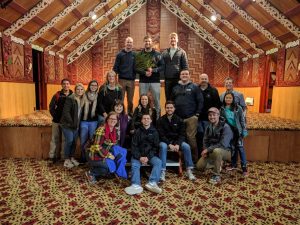
What is it like to be able to spend so much time with students in another country? How does it differ than being in a classroom setting in Abilene?
The experience was outstanding! You get to know the students so well and they get to know you beyond what they see in the classroom. It allows you to speak into their lives on a much deeper level. We learned so much about the students and, hopefully, they know us and our families better.
What were your favorite moments/experiences of the trip?
Two things stood out for me. First, my wife and I were able to renew friendships with people we haven’t seen in 27 years. As far as the academic part of the trip, there are so many things that were enjoyable and informative. I don’t think we had a bad visit and it is really hard to point to one thing. It was interesting as I was reading the students’ journals as they would say, “This is the best thing on the trip!” And then just a day or two later, they would say the same thing! As far as the sightseeing, I would have to say the trip to Hobbiton was the best thing we did.
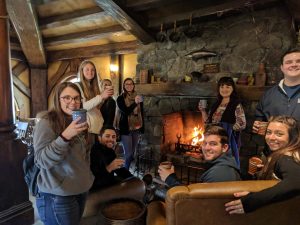
If students could only learn one thing, what do you hope they learned?
That we live in an interconnected world. This is especially true in business. As an aside, I also hope they learned that what we teach and tell them in class really matters!
Anything else I’ve forgotten to mention that you would like to talk about?
We have some outstanding students!
 We are pleased to introduce you to Daniel Garcia (’04), who will be moving to a full-time faculty role within the College of Business Administration this fall. Garcia is from Cancún, Mexico and came to ACU as an international student. He graduated with majors in management and marketing, a certificate in missions, and a minor in global studies. Soon after graduation, Garcia began working in admissions as a multicultural marketing specialist to help recruit a more diverse student body across the U.S. and internationally. He has a masters degree in intercultural communication, a certificate in conflict resolution, and is finishing his M.B.A. through COBA’s new online program. He is currently the Director of Multicultural and International Enrollment and also teaches International Business (BUSA 419) and Principles of Marketing (MKTG 320). His wife, Yukari, is from Japan and they have two little girls and a one-month-old son. Garcia and his family attend the bilingual service at University Church of Christ.
We are pleased to introduce you to Daniel Garcia (’04), who will be moving to a full-time faculty role within the College of Business Administration this fall. Garcia is from Cancún, Mexico and came to ACU as an international student. He graduated with majors in management and marketing, a certificate in missions, and a minor in global studies. Soon after graduation, Garcia began working in admissions as a multicultural marketing specialist to help recruit a more diverse student body across the U.S. and internationally. He has a masters degree in intercultural communication, a certificate in conflict resolution, and is finishing his M.B.A. through COBA’s new online program. He is currently the Director of Multicultural and International Enrollment and also teaches International Business (BUSA 419) and Principles of Marketing (MKTG 320). His wife, Yukari, is from Japan and they have two little girls and a one-month-old son. Garcia and his family attend the bilingual service at University Church of Christ.









 wisdom and direction knowing that He has designed you for His purpose and good works, which he has planned and prepared in advance for you to do.
wisdom and direction knowing that He has designed you for His purpose and good works, which he has planned and prepared in advance for you to do.



